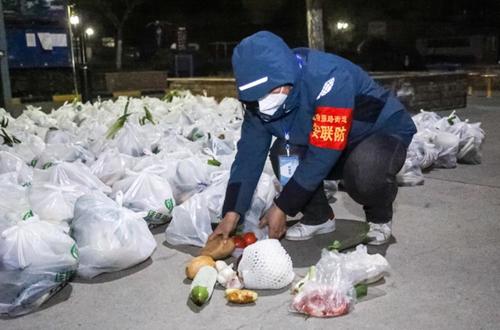Xi'an Paralyzes By Panic As Millions Struggle To Buy Groceries
As the lockdown in Xi'an continues through its second week, 13M residents are getting a taste of what life was like for the millions in Wuhan who suffered through that city's 70+ day lockdown back in the spring of 2020.
Xi'an has counted more than 1,000 cases, with none confirmed to be omicron (China has found some omicron cases in Shanghai and the southern part of the country). As a result, the city has been on total lockdown - with people only allowed to leave once every few days to buy essential goods like groceries.
According to a report in the Caixin business journal, many are struggling to buy groceries as city life grinds to a halt.
Residents in the capital of Shaanxi province have been told since Monday to stay at home unless they need to be out for nucleic acid testing. The city, home to almost 13 million residents, went into lockdown Dec. 23, with movement of the people curtailed and risk areas sealed, amid a growing delta outbreak traced to a Dec. 4 flight from Pakistan. The city has recorded a total number of 1,137 locally confirmed cases between Dec. 9 and Dec. 29.
Desperate residents have taken to social media to complain about online food orders - a last resort for many - that have gone undelivered. Local authorities since Tuesday night started mobilizing districts to deliver free food to residents in sealed areas, but a large number of people still face difficulties in procuring daily necessities.
Meanwhile, residents are also affected by disruptions in health services. Chen Wei’s wife, who is four months pregnant, felt abdominal pain on Saturday, but their community didn’t have designated vehicles for medical purposes, so they had to improvise and find their own treatment: "But now it’s not possible to get approval to go out at all," Chen told Caixin.
Authorities say the outbreak in Xi'an is still in the "rapid development" stage.
At a press conference Wednesday, He Qinghua, a senior official with the National Health Commission, said the local outbreak is still in a rapid development stage, with linked cases reported in other cities in Shaanxi and elsewhere outside the province. That means Xi’an is still unlikely to lift the lockdown anytime soon.
Caixin's report painted a picture of a city in chaos.
Li, the resident of the urban village, reported the shortage of supplies to the city’s hotlines, but no feedback was received. On Friday, rice and eggs in the village supermarket were quickly sold out. And with a further tightening of the disease control measures, all shops in the village were closed on Sunday.
Another Xi’an resident said the city does not have a shortage of supplies, but it lacks enough delivery workers.
Meanwhile, there’s also information asymmetry in the city. “I heard that some supermarkets in the community cannot get their vegetables sold, while residents don’t know how to buy them,” he said.
Residents with chronic health issues are facing a serious problem: many have lost practically all access to care as resources are diverted to dealing with the COVID outbreak. Many hospitals in the city have stopped accepting new or transferred patients, creating serious bottlenecks to care.
Stringent epidemic control measures have disrupted health services across the city, affecting many local patients, including kidney disease patients who urgently need treatment.
Chen, who lives in Xi’an’s Weiyang district, on Saturday called his resident community’s management office, hoping to take his wife to the hospital for an examination. But the office said they are not authorized to give permission, and Chen’s attempts to contact his community and disease control authorities to get approval were in vain.
Another patient with cancer told Caixin that she has had her treatment delayed for several days, after the hospital she attends suspended its outpatient services on Dec. 16.
“It hurts and I cannot sleep at night, so I can only bite my quilt. I feel it cannot be delayed any longer,” she told Caixin. Prior to the lockdown, local authorities had assured tumor patients would be able to get treatment; however, even patients who are not in sealed areas have been cut off from treatment, she said.
For what it's worth, the Global Times reported that the real problem isn't shortages of food supplies, but a difficulty in the "last mile" delivery that's supposed to bring food products to customers placing orders. In response, officials from Xixian New District said at a press conference on Thursday that they are actively coordinating the supply chain, and that they have also set up 1,603 WeChat groups, covering 195 communities, to supply more than 30 kinds of food and medicine for local residents.
Although there have been reports that some hospitals are resuming service for patients who make an appointment.
The outbreak has also impacted some college students who are in the middle of exams. Some have borne the expense of living in hotels while the process is disrupted.
https://ift.tt/3qwrGPk
from ZeroHedge News https://ift.tt/3qwrGPk
via IFTTT





0 comments
Post a Comment